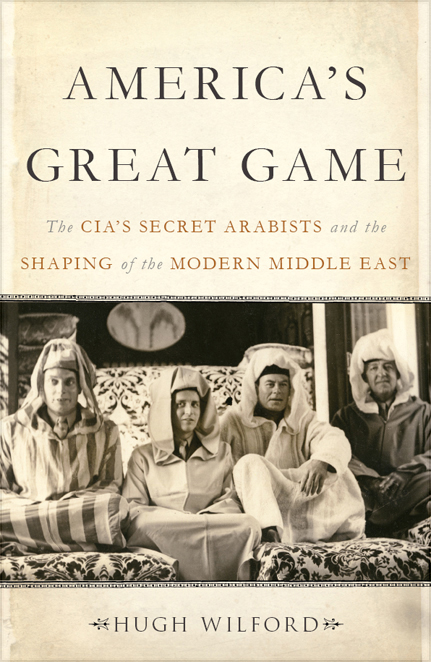
America's Great Game
The CIA's Secret Arabists and the Shaping of the Modern Middle East
کتاب های مرتبط
- اطلاعات
- نقد و بررسی
- دیدگاه کاربران
نقد و بررسی

September 16, 2013
Wilford (The Mighty Wurlitzer), professor of history at California State University, Long Beach, delivers an account of spy games and political maneuvering featuring the aristocratic grandsons of Theodore Roosevelt, Kermit and Archie, and their compatriot Miles Copeland. Reared on exotic tales from the Arabian Nights, adventurous Roosevelt cousins joined the OSS—precursor to the CIA—and ventured afield as elite operatives in Iran, Egypt, and Syria in order to master the clandestine arts, engaging in “psy-war” and tempting targets with the ever-alluring “honey-trap” (in which women are used as lures). Wilford runs through a sordid record of American imperialist pretensions, replete with coups, countercoups, intrigue, subterfuge, non-diplomatic back-channels, and convoluted plots that sometimes “descended into farce”—including attempts at “the possible use of hypnotism in political speech-making.” Often these efforts resulted in futile gestures, gross missteps, or insuperable problems. Yet aside from its reliance upon “the spooky channel” and clandestine intrigue, the United States government used benign means of exercising influence in the region, establishing the Syrian Protestant College (later renamed the American University of Beirut) and the Arabian American Oil Company (ARAMCO). Wilford’s narrative of these ambitious imperialists and their machinations is a cautionary tale of “masculine adventure,” or as the case may be, elite misadventure.

November 1, 2013
By turns admiring and critical play-by-play of CIA Arabists as they directed the Cold War's Middle East chessboard. As the blowback from America's meddling in the Middle East continues to return in the form of the toppling of dictators long supported by Washington, Wilford (History/California State Univ., Long Beach; The Mighty Wurlitzer: How the CIA Played America, 2008, etc.) spotlights the activities of several prominent CIA Arabists who helped manipulate the Cold War regimes in Egypt, Iran, Syria, Jordan and others, often to contradictory and devastating effect. Grandsons of Theodore Roosevelt, raised cavorting around Long Island, and educated at Groton, Archie and Kermit "Kim" Roosevelt, close in age, both gravitated toward action in North Africa and the Muslim world during World War II under the aegis of the Office of Strategic Services (the precursor to the CIA) in Cairo. With the British imperial presence in the region on the wane, the U.S. officers moved to fill the gap: These included the Roosevelts, Miles Copeland, Stephen Penrose, Harold Hoskins and others, who were steeped in Arabic and resolved to encourage a more nationalistic, anti-Zionist approach in Palestine. Working with the American oil industry and Jewish groups like the American Council for Judaism, they attempted to galvanize U.S. public opinion against Zionism. This was defeated, however, by President Harry S. Truman, who, facing re-election, instantly recognized Israel in 1948. Wilford tracks the Arabists as the Cold War ensued from capitals in Syria, Iran, Saudi Arabia and Egypt, as the "crypto-diplomats" worked to put in place nationalistic strongmen who were supposed to be pro-Western and anti-Communist but often proved problematic and intractable, culminating in the Iranian coup of 1953 and the Suez Crisis. A mostly insightful examination of these "Mad Men on the Nile."
COPYRIGHT(2013) Kirkus Reviews, ALL RIGHTS RESERVED.

Starred review from November 1, 2013
American involvement in the Middle East expanded greatly in the two decades after World War II, with the newly formed Central Intelligence Agency (CIA) playing a major role. Wilford (history, California State Univ., Long Beach) portrays the colorful and sometimes dangerous events that wrought change in the region through the careers of three men--Kermit and Archie Roosevelt, representing a traditional elitist version of public service, and Miles Copeland, a new model of a bright, ambitious government official. Wilford presents the conflict between America's aspirations to influence the new nationalist leaders and block communist influence in the region and Arab and Iranian determination to avoid European interference and oppose Israel. He draws upon official records and academic studies but emphasizes personal papers, letters, and interviews to highlight the impact of the idiosyncratic players in the freewheeling world of intelligence gathering and covert operations. Even the well-informed and sympathetic Arabists in the CIA were unable to help America create a consistent or successful Middle Eastern policy. VERDICT A lively and well-balanced examination of American muddling and vacillating in the Middle East. Highly recommended for readers interested in modern Middle East history and those curious about the complicated threads of idealism, adventurism, and imperialism confusing American foreign policy.--Elizabeth Hayford, formerly with Associated Coll. of the Midwest, Chicago
Copyright 2013 Library Journal, LLC Used with permission.

December 1, 2013
After its formation in 1947, the CIA went to work in the Middle East, its highest-profile operation being the 1953 restoration of the shah of Iran. While that episode forms a chapter in Wilford's history of early CIA operations in the region, his work focuses on the intelligence officers who conducted the cloak-and-dagger. In that case, it was a grandson of Theodore Roosevelt, Kermit Kim Roosevelt Jr., whose nickname, borrowed from the title of Rudyard Kipling's novel, evoked his delight in spycraft. Recounting Roosevelt's and several others' lives, Wilford reconstructs the agents' influence as a coterie of CIA operatives on the agency's Middle East activities in the 1950s. Wilford taps the memoirs and personal papers of those Arab experts as well as agency materials he has researched to depict an intelligence service supportive of Arab nationalism and initially opposed to the establishment of Israel, a posture the CIA promoted through the front organization American Friends of the Middle East. Suggesting significant effects wrought on events by American secret agents, Wilford merits the attention of students of CIA history.(Reprinted with permission of Booklist, copyright 2013, American Library Association.)

























دیدگاه کاربران